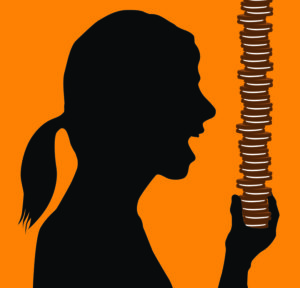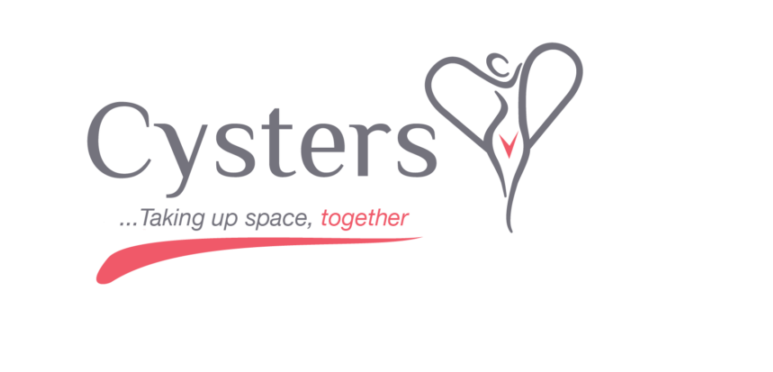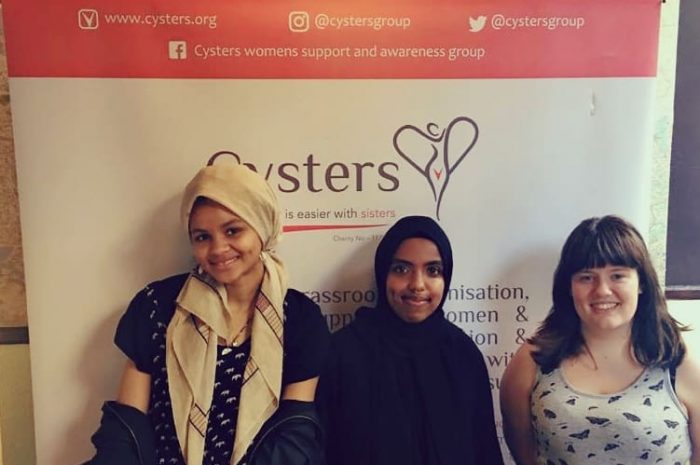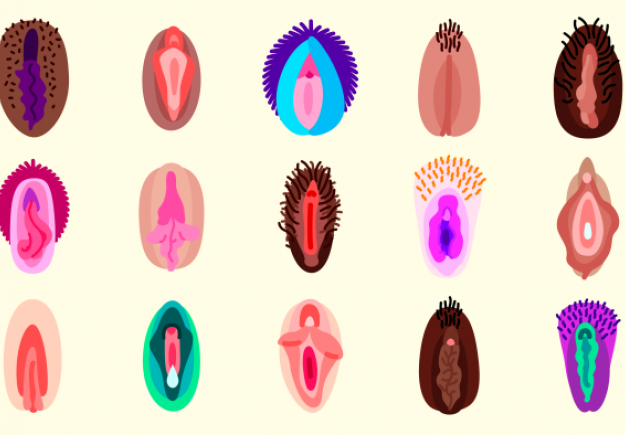
Elizabeth Schneider, MS
If you’re like me and ever curious about your body and its functions, you’ve probably ‘Googled’ your condition, Polycystic Ovarian Syndrome (PCOS). This search typically yields the same sort of results about PCOS symptoms: ‘irregular menstrual periods, excess body and facial hair, obesity, infertility, etc.’
Having done this a few times, I, perhaps like you, accepted this as the final story of PCOS. Flash forward two years, I’m sitting in the university library as a first-year PhD student studying eating behaviour, and I come across a paper describing the connection of PCOS and binge-eating (BE) i.e. eating too much in one sitting. Deeper digging then produces a search of 338 results of academic studies evidencing a robust link between BE and PCOS. This connection is an emerging concept in the field of PCOS and eating behaviour and shows promise for better understanding the disorder and what’s going on when eating may seem out of your control.
PCOS and Binge-Eating
PCOS is an endocrine disorder characterized by testosterone and ovulatory dysfunction in women (March et al., 2010).Testosterone is a sex hormone that is often associated with men for its role in male sexual characteristics. Women, however, also require this hormone for reproductive health, but women with PCOS tend to have more than is needed. However, recent research suggests that the effects of PCOS are not limited to reproductive issues and potentially even impact behaviours such as eating patterns.
When examining prevalence of BE in women with PCOS, researchers found that 60% of women with PCOS and obesity had BE symptoms. Interestingly, even lean women with PCOS had much higher rates of BE behaviour, suggesting that BE is associated with PCOS independent of weight status (Jeanes et al., 2017). Not only do women with PCOS tend to binge-eat more, but they tend to eat more sweet than savoury snacks and more calories overall (Barr, Hart, Reeves, Sharp, & Jeanes, 2011; Wylie, Barr, & Jeanes, 2009).
Another study found that women with PCOS (compared to women without PCOS) had much higher instances of eating disorders e.g., binge-eating (Tay, Teede, Hill, Loxton, & Joham, 2019). Furthermore, not only did they have unusual eating patterns, but they also had higher rates of low self-esteem and psychological distress (e.g., anxiety and depression), both of which are associated with eating problems (Brechan & Kvalem, 2015). These results align with previous findings of lower reports of an emotional quality of life in women with PCOS (Deeks, Gibson-Helm, & Teede, 2010)[o1] .
What’s the Cause?
Researchers are still uncertain as to the reason behind the connection between PCOS and BE. Some researchers believe that extra testosterone is the culprit, because testosterone is linked to food cravings and poor impulse control, both of which are associated with BE (Baker, Girdler, & Bulik, 2012; Schag, Schönleber, Teufel, Zipfel, & Giel, 2013). This theory is given credence by the fact that BE is often reduced when women are prescribed anti-testosterone medication (Naessén, Carlström, Byström, Pierre, & Lindén Hirschberg, 2007).
The sugar-regulating hormone, insulin, may also be to blame, as women with PCOS tend to have higher insulin resistance. This resistance to insulin can lead to increased appetite and cravings for carbohydrate-rich foods (Krug, Giles, & Paganini, 2019). Another more obvious possibility is that PCOS is related to poorer psychological health, which can also lead to eating-related concerns (Herpertz-Dahlmann, Wille, Hölling, Vloet, & Ravens-Sieberer, 2008).
Regardless of the reason for this phenomenon, it’s clear that PCOS is behind much more than reproductive issues. With already shocking findings of PCOS and overeating, we can only imagine what other symptoms will come to light about PCOS. So, if you’re reading this and concerned that you may be eating too much, remember that your body may be more in control than you think. A frank discussion with your GP and a health screening may be better than beating yourself up for things outside your control.
References
Baker, J. H., Girdler, S. S., & Bulik, C. M. (2012). The role of reproductive hormones in the development and maintenance of eating disorders. Expert Review of Obstetrics and Gynecology. https://doi.org/10.1586/eog.12.54
Barr, S., Hart, K., Reeves, S., Sharp, K., & Jeanes, Y. M. (2011). Habitual dietary intake, eating pattern and physical activity of women with polycystic ovary syndrome. European Journal of Clinical Nutrition. https://doi.org/10.1038/ejcn.2011.81
Brechan, I., & Kvalem, I. L. (2015). Relationship between body dissatisfaction and disordered eating: Mediating role of self-esteem and depression. Eating Behaviors. https://doi.org/10.1016/j.eatbeh.2014.12.008
Deeks, A. A., Gibson-Helm, M. E., & Teede, H. J. (2010). Anxiety and depression in polycystic ovary syndrome: A comprehensive investigation. Fertility and Sterility. https://doi.org/10.1016/j.fertnstert.2009.09.018
Herpertz-Dahlmann, B., Wille, N., Hölling, H., Vloet, T. D., & Ravens-Sieberer, U. (2008). Disordered eating behaviour and attitudes, associated psychopathology and health-related quality of life: Results of the BELLA study. European Child and Adolescent Psychiatry. https://doi.org/10.1007/s00787-008-1009-9
Jeanes, Y. M., Reeves, S., Gibson, E. L., Piggott, C., May, V. A., & Hart, K. H. (2017). Binge eating behaviours and food cravings in women with Polycystic Ovary Syndrome. Appetite. https://doi.org/10.1016/j.appet.2016.11.010
Krug, I., Giles, S., & Paganini, C. (2019). Binge eating in patients with polycystic ovary syndrome: Prevalence, causes, and management strategies. Neuropsychiatric Disease and Treatment. https://doi.org/10.2147/NDT.S168944
March, W. A., Moore, V. M., Willson, K. J., Phillips, D. I. W., Norman, R. J., & Davies, M. J. (2010). The prevalence of polycystic ovary syndrome in a community sample assessed under contrasting diagnostic criteria. Human Reproduction. https://doi.org/10.1093/humrep/dep399
Naessén, S., Carlström, K., Byström, B., Pierre, Y., & Lindén Hirschberg, A. (2007). Effects of an antiandrogenic oral contraceptive on appetite and eating behavior in bulimic women. Psychoneuroendocrinology. https://doi.org/10.1016/j.psyneuen.2007.03.008
Schag, K., Schönleber, J., Teufel, M., Zipfel, S., & Giel, K. E. (2013). Food-related impulsivity in obesity and Binge Eating Disorder – a systematic review. Obesity Reviews. https://doi.org/10.1111/obr.12017
Tay, C. T., Teede, H. J., Hill, B., Loxton, D., & Joham, A. E. (2019). Increased prevalence of eating disorders, low self-esteem, and psychological distress in women with polycystic ovary syndrome: a community-based cohort study. Fertility and Sterility, 112(2), 353–361. https://doi.org/10.1016/J.FERTNSTERT.2019.03.027
Wylie, J., Barr, S., & Jeanes, Y. (2009). Eating frequency and snacking habits in women with polycystic ovary syndrome. Journal of Human Nutrition and Dietetics. https://doi.org/10.1111/j.1365-277x.2009.00952_25.x



